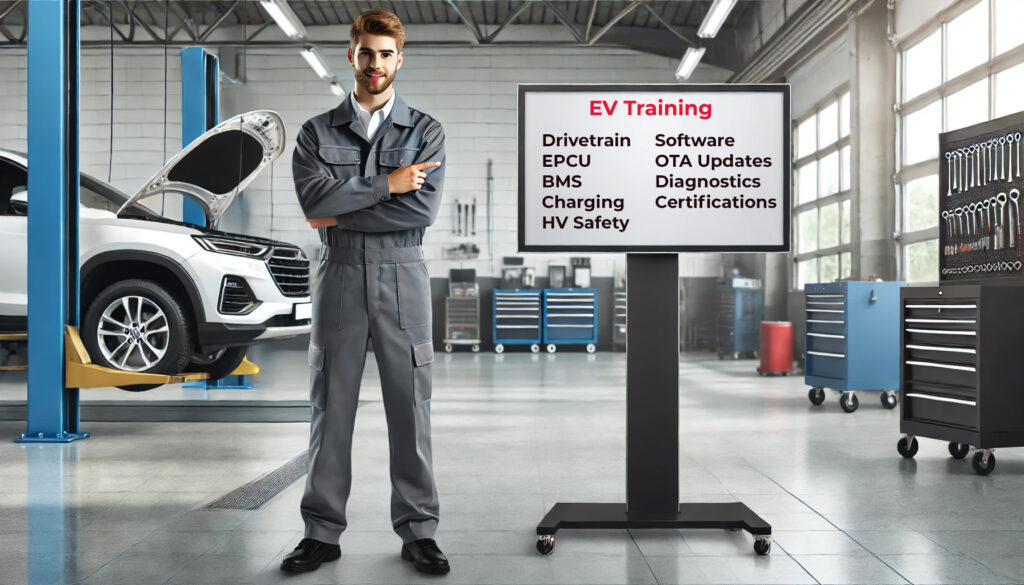EV Training and Certification: Preparing for the Future of eMobility
by: Graham Stoakes
As the automotive industry transitions towards electrification, the demand for skilled professionals trained in Electric Vehicle (EV) technology is rapidly increasing. Although this may be a scary prospect for some, it should be seen as an opportunity rather than a threat.
EVs differ significantly from traditional internal combustion engine (ICE) vehicles, requiring specialized knowledge for their operation, maintenance and most importantly, safety. Training and certification programs are essential to ensure that technicians, sales personnel, fleet managers, and even EV owners understand these advanced systems.
Understanding EV Technology and Components
Electric Vehicles operate with an entirely different propulsion system compared to ICE vehicles. At the core of an EV is the high-voltage battery, which stores and supplies electrical energy. This battery powers the motor generators, which convert electrical energy into mechanical movement and, through regenerative braking, can also recover energy to help recharge the battery. To manage this conversion, an inverter is required to transform direct current (DC) from the battery into alternating current (AC) used by the motor and back the other way when charging.
To ensure safety and efficiency, an EV relies on a thermal management system to regulate battery and component temperatures, as well as a battery management system (BMS) to monitor battery health, efficiency, and longevity. High-voltage cables, insulated for safety, connect these components, and charging ports allow vehicles to receive energy from external sources, either at home, through public charging stations, or via high-speed DC chargers.
The Importance of EV Training
As EVs become more prevalent, training programs are crucial for multiple groups:
- Auto Technicians and Mechanics: Given the high-voltage dangers of EVs, specialized training is necessary to ensure safe handling and maintenance. This includes learning about the dangers of high-voltage, personal protective equipment (PPE), insulated tools, and diagnostic techniques.
- Sales and Fleet Managers: While not needing in-depth technical expertise, these professionals must understand EV components, charging systems, and operational differences to effectively assist customers and manage vehicle fleets.
- EV Owners: Understanding the basic workings of an EV, especially charging and maintenance requirements, helps dispel misconceptions and enhances user confidence in adopting EV technology.
Training ensures that professionals are well-versed in both the advantages and challenges of EV technology, including battery life, charging infrastructure, efficiency, and environmental impact.
Certification Programs for EV Training
Certification programs validate expertise in EV technology and provide industry recognition. In the UK, the Institute of the Motor Industry (IMI) offers structured EV qualifications across four levels:
- Level 1: Basic awareness of EVs, which may be suitable for non-technical personnel.
- Level 2: Introduction to EV servicing, covering basic safety procedures and maintenance.
- Level 3: Advanced servicing, diagnostics, and replacement of EV system components.
- Level 4: Master-level qualification for diagnosing and repairing high-voltage EV systems and components.
These qualifications are also available internationally (see https://tide.theimi.org.uk/)
Additional certification bodies, such as City and Guilds, offer vocational qualifications for EV maintenance, while manufacturers provide brand-specific training, however, this may not be recognized across different automakers. Independent certified training programs are also available, often accredited by professional bodies like the IMI.
Information to support training in EV operation and maintenance can be found in textbooks such as, The Principles of Electric Vehicle Technology (www.grahamstoakes.com), and training organisations like ProMoto Europe (https://www.pro-moto.co.uk/).
The Future of EV Licensing and Workforce Development
Currently, there are no mandatory licenses required to work on EVs in the UK, though professionals must adhere to general health and safety regulations. However, discussions are underway to implement official licensing requirements due to the potential hazards of working with high-voltage systems. The IMI TechSafe register serves as a voluntary scheme, which recognises and showcases competence, trustworthiness, and commitment to learning and development in key, safety-critical automotive technologies, such as Electric, Hybrid, Hydrogen, and ADAS-equipped vehicles..
With the increasing adoption of EVs, the need for trained professionals is growing exponentially. Workshops must invest in high-voltage PPE, insulated tools, battery lifting equipment, and diagnostic devices to meet the evolving requirements of EV servicing. Additionally, technicians must be prepared to adapt to new maintenance approaches, as traditional home mechanics may struggle to work safely with high-voltage components.
Conclusion
The rise of EVs presents both challenges and opportunities for the automotive industry. Training and certification programs play a pivotal role in equipping professionals with the skills necessary to service and maintain EVs safely and efficiently. As governments push for greener transportation solutions, the industry must stay ahead with skilled personnel ready to support this technological revolution. Although training is never a universal solution, it should be seen as an investment which will increase business, awareness and safety, rather than an unnecessary expense; ensuring a safer and more sustainable future for all.


